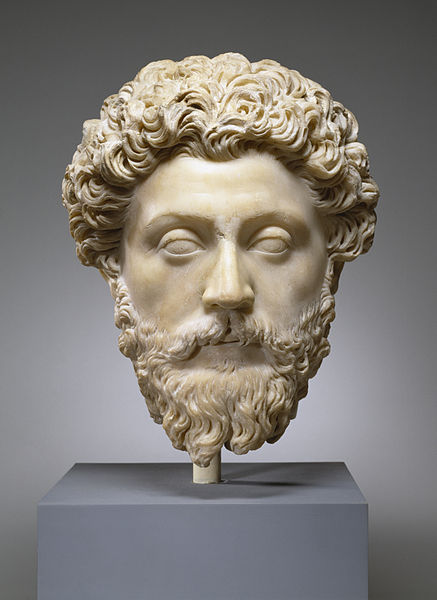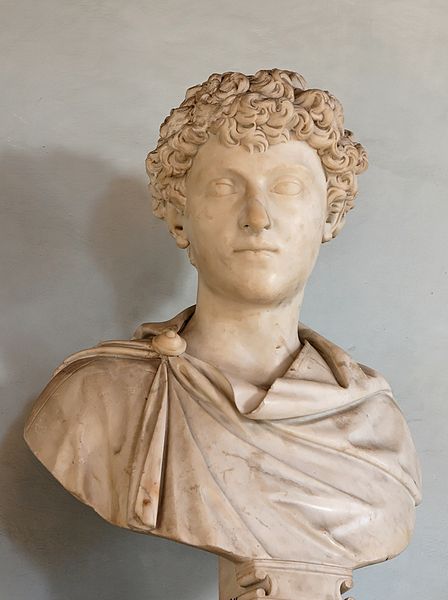
The Thammasat University Library has acquired a new book that should be of interest to students of history, world literature, philosophy, medicine, and related fields. How to Think Like a Roman Emperor: The Stoic Philosophy of Marcus Aurelius is about a philosopher who served as Emperor of Rome almost 2000 years ago. He was noted for this thoughts, or meditations that were considered part of stoic philosophy. Stoic philosophy argued that people can be happy if they accept each moment as it happens, without worrying too much about having fun or if new things will be hurtful. It is enough to think and try to understand the world and work with others, while treating everyone fairly and honestly.
The Stoics also believed that doing good things was the main concern for people, and such benefits as health, money, and fun have no value in themselves, but only depend on what is done with them.
The TU Library owns a number of books about Marcus Aurelius and stoic philosophy.
Dr. Donald Robertson, the author of How to Think Like a Roman Emperor, is a cognitive psychotherapist. As students in the TU Faculty of Allied Health Sciences know, cognitive psychotherapy deals with learning skills to change behavior, beliefs, and thinking. Using Marcus Aurelius as the basis for his research, Dr. Robertson addresses such subjects as how to speak wisely; how to follow your values; how to tolerate pain; how to relinquish fear; and how to conquer anger, among others.
Here are some excerpts from the Meditations of Marcus Aurelius:
- You will find rest from vain fancies if you perform every act in life as though it were your last.
- When you wake up in the morning, tell yourself: The people I deal with today will be meddling, ungrateful, arrogant, dishonest, jealous, and surly. They are like this because they can’t tell good from evil.
- There is a limit to the time assigned you, and if you don’t use it to free yourself it will be gone and never return.
- Yes, you can–if you do everything as if it were the last thing you were doing in your life, and stop being aimless, stop letting your emotions override what your mind tells you, stop being hypocritical, self-centered, irritable.
- You don’t love yourself enough. Or you’d love your nature too, and what it demands of you. People who love what they do wear themselves down doing it, they even forget to wash or eat. Do you have less respect for your own nature than the engraver does for engraving, the dancer for the dance, the miser for money or the social climber for status? When they’re really possessed by what they do, they’d rather stop eating and sleeping than give up practicing their arts. Is helping others less valuable to you? Not worth your effort?
- To shrug it all off and wipe it clean – every annoyance and distraction – and reach utter stillness. Child’s play.
- Some people, when they do someone a favor, are always looking for a chance to call it in. And some aren’t, but they’re still aware of it–still regard it as a debt. But others don’t even do that. They’re like a vine that produces grapes without looking for anything in return.
- A horse at the end of the race… A dog when the hunt is over… A bee with its honey stored… And a human being after helping others. They don’t make a fuss about it. They just go on to something else, as the vine looks forward to bearing fruit again in season. We should be like that. Acting almost unconsciously.
- In a sense, people are our proper occupation. Our job is to do them good and put up with them. But when they obstruct our proper tasks, they become irrelevant to us–like sun, wind, and animals. Our actions may be impeded by them, but there can be no impeding our intentions or our dispositions. Because we can accommodate and adapt. The mind adapts and converts to its own purposes the obstacle to our acting. The impediment to action advances action. What stands in the way becomes the way.
- What is not good for the swarm is not good for the bee.
- Never let the future disturb you. You will meet it, if you have to, with the same weapons of reason which today arm you against the present.
- Very little is needed to make a happy life.
- No carelessness in your actions. No confusion in your words. No imprecision in your thoughts.

Thailand and Marcus Aurelius
Last year, an article appeared in The Phuket News suggesting that the Stoics and Marcus Aurelius might be useful for Thai readers:
Take control. With regards to events in our lives, we can actually control very little. The only thing we really control is how we think about external events, our own judgements and actions upon them.
“We should always be asking ourselves: ‘Is this something that is, or is not, in my control?’” – Epictetus
Train the mind. Reflect rationally on what events are causing negative emotions and unhappiness. If they are not within our control, accept them and find creative solutions, not focus on the issue. If, as example, we encounter angry, stressed people in our day, reflect that it is not their intention. It is their own mistaken judgement.
“Today I escaped from anxiety. Or no, I discarded it, because it was within me, in my own perceptions — not outside.” – Marcus Aurelius
Accept what happens. We should understand our relevant importance. Our lives are but a series of moments. True connection and observance with nature and our place within it will lead to a happier mind. If you expect the universe to deliver what you want, it will lead to disappointment. If you embrace whatever the universe gives, life will be a lot smoother.
“Fate leads the willing, and drags along the reluctant.” – Seneca
Whilst being largely lost to the masses for millennia, Stoicism has always had its influences across the ages.
Consider the Serenity prayer. “… grant me serenity to accept the things I cannot change, courage to change the things I can, and the wisdom to know the difference.”
In prison, Nelson Mandela was sneaked in a copy of Marcus Aurelius’ Meditations, a popular book on the Roman emperor’s private notes to himself and a key text on stoic philosophy. It is said to have strongly influenced Mandela’s approach to life and his latter presidency of the people.
Modern Cognitive Behavioural Theapy (CBT) is based on the stoic idea that how we think (cognition), how we feel (emotion) and how we act (behaviour) all interact to determine our state of mind and happiness.
All good advice, but as we all know it’s a lot easier said than done. But the next time the tuk-tuk driver screams at me in Patong, when the immigration officer sends me away for yet another never-requested-before photocopy, or disgruntled readers of this monthly column attempt to disrupt my island life inner calm, I’ll try to remind myself that it’s all Greek to me.

(All images courtesy of Wikimedia Commons)
